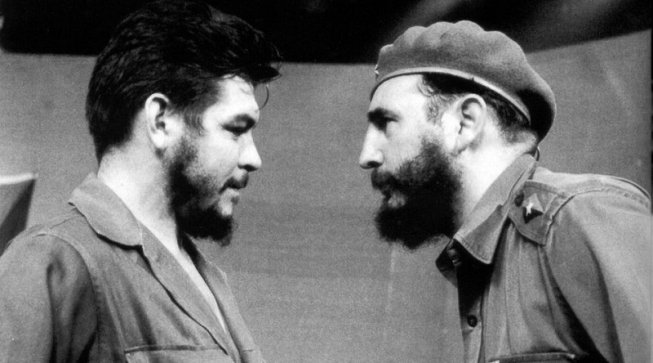This article was originally published on La Izquierda Diario
In his “Message to the People of the World through the Tricontinental,” Che stated: “autochthonous bourgeoisies have lost their capacity to oppose imperialism—if they ever had it—and now trail behind it. There are no other alternatives; either a socialist revolution or a caricature of a revolution.” In this article, he approaches a key issue for any revolution: the matter of workers’ democracy or the organization of the masses.
“Socialism and Man in Cuba” is very well-known and has been extensively defended and criticized from opposite angles for the same reason: the importance given by Guevara to the matter of moral strength and the subjective factors in the construction of socialism.
On the occasion of the 60th anniversary of it’s triumph, the legacy of the Cuban revolution is once again under debate. Che’s article thus warrants revisiting and should be analyzed on the basis of lessons from other historical experiences, as well as the contributions of Marxist theory.
An aspect that is not often considered but is of great importance in Che Guevara’s thought is the role of the working class in the construction of socialism, the forms of organization of the revolution in general and of the transition in particular. The text does not provide a final answer to this matter, but the issue is raised as a problematic, unresolved matter to which no one had yet (in 1965) found an answer.
Che Guevara indicated the importance of the revolutionary vanguard, but stressed that the main player in the entire revolutionary process is what he calls “the masses:” “The masses participated in the Agrarian Reform and in the difficult undertaking of running state enterprises. They underwent the heroic experience of Playa Girón. They were tempered in the struggle against the groups of bandits armed by the CIA. During the October Crisis, they experienced one of the most important defining events of modern times and today they continue to work in the construction of socialism.”
However, the relationship between the government and the masses is essentially presented in a single direction, from top to bottom: “…with incomparable enthusiasm and discipline, the masses carry out the tasks set by the government, whether they be related to the economy, culture, defense, sports, etc. The initiative generally comes from Fidel or the high command of the revolution, and it is explained to the people, who make it their own. At times, local experiences are taken up by the party and the government and are thereby generalized, following the same procedure.”
In this context, Che Guevara indicated the importance of a “dialectical interrelation” between the masses and the leaders of the revolution, while analyzing the link between the “vanguard” organized in the Party and the masses, which were often driven forward by the vanguard. He thus arrived at a highly controversial and fundamentally erroneous definition: the “dictatorship of the proletariat” was imposed “not only on the defeated class, but also on the triumphant class.”
In order to solve this problem, “Che” Guevara highlighted a key deficiency in the revolutionary process, namely the institutions of the revolution: “To achieve total success, all of this involves the necessity of a series of mechanisms, the revolutionary institutions. The concept of institutionalization fits in with the images of the multitudes marching toward the future as that of a harmonic set of channels, steps, reservoirs and well-oiled apparatuses that make the march possible, that allow the natural selection of those who are destined to march in the vanguard and who dispense rewards and punishments to those who fulfill their duties or act against the society under construction. The institutionality of the revolution has still not been achieved. We are seeking something new that will allow a perfect identification between the government and the community as a whole, adapted to the special conditions of the construction of socialism, while avoiding to the utmost the commonplaces of bourgeois democracy transplanted to the society in formation (such as legislative houses, for example). Some experiments have been carried out with the aim of gradually institutionalizing the revolution, but without too much haste. We have been greatly restrained by the fear that any formal aspect might separate us from the masses and the individual and make us lose sight of the ultimate and most important revolutionary aspiration: to see man freed from alienation.
Notwithstanding the lack of institutions, which must be gradually overcome, the masses are now making history as a conscious group of individuals struggling for the same cause. In spite of the apparent standardization of man in socialism, he is more complete. The possibilities he has of expressing himself and making himself heard in the social apparatus are infinitely greater, despite the lack of a perfect mechanism for this purpose.”
With these thoughts, and without making this explicit, Che Guevara was addressing a fundamental issue in the Cuban revolutionary process: the absence of working-class and peasant mass institutions of direct democracy, like the soviets in the Russian Revolution and all kinds of related experiences that were carried out in other processes, through factory councils, coordinating committees or cordones industriales (organs of workplace democracy in Chile in the early ‘70s). The absence of an organization of this kind in the Cuban revolution greatly hindered what Che Guevara himself considered a necessity: the increase of mass participation “in all decision-making and production mechanisms.” And, paradoxically, this problem highlighted by Che Guevara was a product of the Cuban leadership’s policy towards the workers’ movement, characterized by the monolithic unity of the Central de Trabajadores de Cuba (Workers’ Central Union of Cuba) and its top-to-bottom economic planning.
Contrary to this policy, in order to unite the citizens and producers, it was necessary to establish an institution like the soviets (i.e. assemblies of representatives from rank-and-file workers in factories and workplaces that were also coordinated on a regional and national scale). This is the type of organization that allows “the masses” to become a true “constituent power.” Initiatives are not taken from top to bottom, so that rank-and-file workers can “approve” what was already discussed by the leaders. The process of democratic self-organization allows a much more egalitarian relationship between the leaders and their base.
During the consolidation of a totalitarian regime in the USSR in the late 30s, it was Leon Trotsky, the main adversary of Stalinism and bureaucratization, who emphasized the need to fight for soviet democracy as an essential banner, not as a matter in relation to the formal structure of the revolution’s institutions, but as a fundamental political matter: the “moral strength” emerges from the masses taking their fate into their own hands.
Therefore, the reestablishment in the USSR of the democratic organization of workers and peasants through the soviets, with the acknowledgment of all working-class and peasant political movements that defended the gains of the revolution, removing the bureaucratic caste, was one of the Trotskyists’ banners for safeguarding the revolution.
This idea was far from being an abstract theory during the emergence of revolutionary processes in the 20th century. In the 50s and 60s, the uprisings in Eastern European countries (East Germany in 1953, Hungary in 1956, Czechoslovakia in 1968), although they did not include Trotskyist groups with any significant influence, were led by working-class sectors that defended socialism and repudiated the bureaucracies, and were based on forms of rank-and-file organization that ranged from factory assemblies to workers’ councils, comprising extensive urban areas.
In this context, Che Guevara had the acuity and perceptiveness to see that it was necessary to give the central participation of the masses a concrete form, but without the clear programmatic and strategic perspective required to organize it from the bottom up and overcoming the vertical power structures of the Cuban state.
The answer provided in the text to this unresolved matter is based on the concept and perspective of the “new man,” driven, educated and ultimately constructed by the vanguard.
In his superb chronicle “Soviets in Action,” John Reed, a journalist and sharp observer of the Russian Revolution, described the multiple functions of the soviets: as conscious organs workers’ decision-making, essential to taking the pulse of the revolution before and after taking power, and as schools for economics and politics.
Reed describes the institutions that emerged from the mass movement as follows: “The chief function of the soviets is the defense and consolidation of the revolution. They express the political will of the masses, not only in the All-Russian Congresses, where their authority is practically supreme. This centralization exists because the local soviets create the central government, and not the central government the local soviets.” Organized from below, he adds, “the soviets are the most perfect bodies of working class representation, it is true, but they are also the weapons of proletarian dictatorship, to which all anti-Bolshevik parties are bitterly opposed.”
It is not surprising that the Stalinist bureaucracy set out to eliminate the soviets to safeguard its caste power.
The absence of this kind of organization was not the only weakness of the Cuban Revolution (the infeasibility of socialism in one country is another); however, it is one of its main deficiencies. Discussing and drawing conclusions from this issue raised by Che but not resolved by the revolution is essential to preparing the next revolutionary processes, to draw on the best aspects of the invaluable legacy of this milestone in Latin American history.











